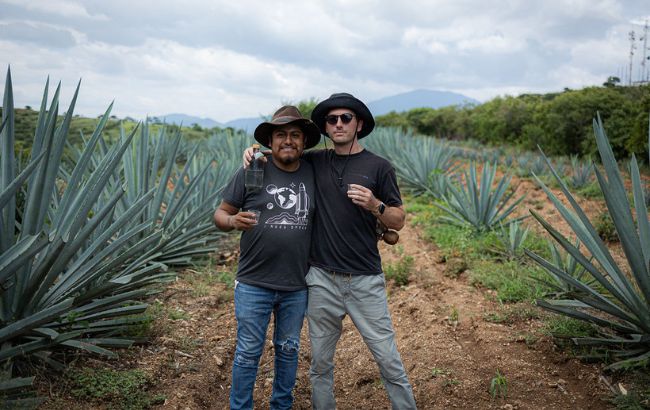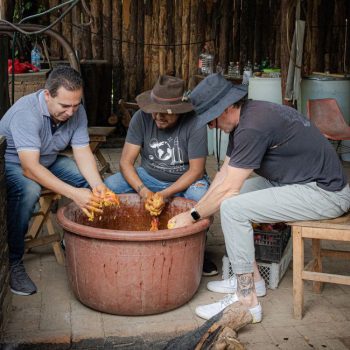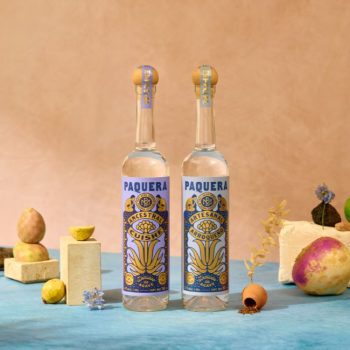Is uncertified mezcal the answer to tariffs?
US mezcal brand Paquera will not certify its two new agave spirits, claiming it will ease the financial burden on producers and consumers.

Paquera was created by Ben Zerbe in 2018 with the aim of creating a cooperative network of maestro mezcaleros. The brand works with different small producers to bring ethically made mezcals – and now agave spirits – to the US.
“When we say mezcal or Tequila, that word is like a trademark – a marketing thing, right? It’s a category,” explains Zerbe, adding that being able to say your product is a mezcal is helpful for interacting with people who aren’t experts. “When you say ‘agave spirits’, it could be a lot of different things.”
This is why, when he first launched Paquera in 2018, he thought it was important to have mezcal front and centre of the brand. “Mezcal was just starting to become popular, and the education wasn’t there yet,” he explains. “From a business standpoint, it was smart. But now we’re finding there are so many great, small family producers that have incredible expressions that they don’t want to certify, and we want to bring them to market.”
He thinks that in general, consumers are now educated enough to respect uncertified mezcals, and will look past the lack of ‘mezcal’ written on the bottle to instead look for information about agave type, producer and region.
While he’s keen to relate the positives of foregoing certification, he isn’t completely against it – and is likely to certify mezcals for Paquera in the future: “We’re not advocating for one way or the other. It’s just really based on the needs of the business and who you’re working with.”
Jose Ramirez, who Zerbe describes as “essentially a co-founder” of Paquera, worked with Comercam to create the regulatory process. “I think creating a certification process was extremely important, because it gives people an identifier of what mezcal is. When you say ‘agave spirits’, it could be made anywhere – now you have Australian companies growing agave.” The denomination of origin “gives credibility to the region and to the producers who deserve it”.
“Where it gets tricky and the drawback of agave spirits and uncertified mezcal is that it allows the door too wide open. If you have people making it in Australia or California, it devalues a little bit of the spirit’s essence. Yes, you can build a palenque in the state of California, but what makes this spirit so great is soil composition, the terroir, the region, the altitude, the fact the process has been passed down for generations.”

Why not certify?
To certify a mezcal, a producer needs to work with Comercam, Mexico’s mezcal regulator. Zerbe argues that for producers in small villages in rural regions, certification can be costly and complicated. “They have to send people out to lab test. They have to pay certain taxes to get this opportunity to certify,” he says, adding that certification could also involve a producer needing to change their operations to appease Comercam.
“There are requirements that Comercam has to certify mezcal, and if they fall a little bit out of that, even though it’s still safe for consumption, they will not certify it. It’s basically telling a fifth-generation family: ‘Hey, this mezcal doesn’t qualify as mezcal’.
Zerbe can’t put an exact figure on certification – especially as it’s an ongoing process, with producers needing to keep up with every batch – but he says that in his experience, “for the producers who don’t want to certify, they express it’s primarily a financial issue.”
The producers Paquera worked with on its first mezcals chose to certify, and the brand has helped others get certification, but to continue only supporting those sorts of businesses would be against the brand’s ethos. “With Paquera, we wanted to be a co-op business. We wanted to work with only small family producers doing very small-batch spirits, because we feel every batch tells the story of the region of the producer,” he explains.
The producers who have chosen to certify their mezcals already have the resources to do so. “If you’re in a place like Santiago Matatlán, which is only 40 minutes from central Oaxaca, it’s very easy to do that, but if you’re four hours in the middle of nowhere, maybe Comercam doesn’t show up for two weeks.”
“I hope to see more agave spirits coming out that are not mezcal-certified, because I think those are the producers who deserve an opportunity to have their expressions released and tasted.”
Paquera’s decision was made before Trump introduced – then delayed – 25% tariffs on Mexican imports into the US, but the news only reinforced the brand’s plans. “How are people supposed to survive in terms of the production side?” Zerbe asks. “Are they really going to pay the Mexican government – Comercam – to certify their mezcal and then the brand importing it is going to pay 25%?”
While he’s far from happy about the threat of tariffs, he thinks it will encourage a growth of uncertified agave spirits coming out of Mexico. “Producers in Mexico want to certify because they want to sell their stuff in the US,” he explains.
“With these tariffs, the conversation is: how do you produce something and not have it cost so much money?” Wild agave spirits can cost US$150. “To a Bourbon or vodka drinker, that’s crazy expensive. We need to continue to educate people on why it costs that much,” he says, adding that increased costs and tariffs could mean his agave spirits rack up to US$200 a bottle. “You can pass it on to the customers, but if they don’t want to buy it because it’s too expensive, then what happens? It’s going to hurt everybody on the production side.
“Uncertified agave spirits give people an opportunity to try something that’s great and unique without paying crazy money for it.”

The new expressions
The two new agave spirits from Paquera are from two different producers and have never before left their respective villages of origin. “They’re not even selling it in central Oaxaca,” says Zerbe.
The first is a Cuishe agave spirit, produced by Hafid Rodriguez, whom Zerbe describes as “the future of mezcal” owing to his scientific approach to agave cultivation. Rodriguez has developed an organic fertiliser that shortens the growth cycle of Cuishe from around 15 years to nine, making cultivation more feasible. His production is entirely ancestral, using clay pot distillation and hand-mashing the agave.
Bottled at 48% ABV, the Cuishe expression features a bottle design inspired by Oaxacan culture, and will retail for US$$132.99.
The second release is an Arroqueño agave spirit made by brothers Teodolo and Pedro Vasquez. Arroqueño, a relative of the more common Espadín agave, is known for its pronounced smokiness. This expression is distilled in traditional copper stills, bottled at 50% ABV and retails for US$95.99. Unlike Rodriguez’s ancestral methods, the Vasquez brothers use a tahona for milling, and their palenque is so remote that reaching it requires crossing multiple rivers. “If it rains that day, you cannot leave,” says Zerbe.
“We only got this opportunity because we presented to them in person,” he adds. “They had said ‘no’ to others, but they trusted us to tell their story.”
The design of both bottles is inspired by Oaxacan culture, in particular the hand-painted ceramic tiles common in the region. The type of agave is proudly printed in large font, along with the production notes.
“If I could give any advice to anybody, if you make mezcal or agave spirits, put the production notes on the bottle,” Zerbe says. “If you just have a label and you don’t know who’s making it, how it’s made, how long the agave took to grow – it’s really hard to know and feel if that is like a good quality mezcal. I think it’s important.”
Related news
